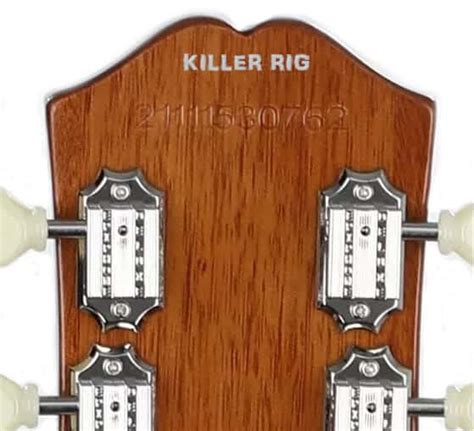Read Your Epiphone Serial Number Like a Pro
Epiphone guitars, known for their blend of affordability and quality, boast a rich history. Understanding your Epiphone's serial number is key to unlocking its story – its age, place of manufacture, and even potential model variations. This guide will teach you how to decipher your Epiphone serial number like a pro, revealing the secrets hidden within those seemingly random numbers and letters.
What Does an Epiphone Serial Number Tell Me?
An Epiphone serial number acts as a unique identifier, offering valuable insights into your guitar's history. By decoding it, you can determine:
- Year of Manufacture: This is arguably the most sought-after piece of information. Knowing the year helps you understand the guitar's age and potential value.
- Place of Manufacture: Epiphone guitars have been produced in various locations throughout their history, including the USA, Japan, Korea, China, and other countries. The serial number often reveals the manufacturing location.
- Model Variations: Sometimes, subtle variations within a model year can be identified through the serial number. These variations might involve different components or manufacturing processes.
Decoding Your Epiphone Serial Number: A Step-by-Step Guide
Unfortunately, there's no single, universally applicable decoder for Epiphone serial numbers. The format has changed significantly over the decades, meaning the interpretation varies depending on the guitar's age. However, here's a breakdown of common formats and what to look for:
Identifying the Location of Your Serial Number
Before we dive into decoding, it's crucial to know where to find the serial number. It's typically located on the back of the headstock, though sometimes it can be found inside the soundhole (particularly on acoustics). Look closely – it's usually stamped or printed.
Interpreting Different Serial Number Formats
Epiphone's serial number system has evolved over time, resulting in a variety of formats. Here are some examples and general guidelines:
-
Older Epiphones (Pre-1980s): These often have simpler serial numbers, potentially only featuring numbers. Dating these requires more research and cross-referencing with other sources like online forums and databases dedicated to vintage Epiphone guitars.
-
Mid-1980s to Early 2000s: This era often features alphanumeric serial numbers. You'll likely see a combination of letters and numbers. The letters often provide clues to the manufacturing location or model. Online resources dedicated to Epiphone serial numbers are extremely helpful for this period.
-
Post-2000s: More recent Epiphones sometimes have longer, more complex serial numbers, which may incorporate a combination of numbers and letters offering more detailed information. While these can be more challenging to fully decode without specialized tools, the first few digits still often indicate the year of manufacture.
Important Note: Online databases and forums dedicated to Epiphone guitars are invaluable tools for deciphering your serial number. Searching online with your serial number might lead you directly to information about your specific guitar model and its production year.
Frequently Asked Questions (FAQs)
How accurate is decoding an Epiphone serial number?
While serial number decoding is generally reliable, it's not always perfectly accurate. Manufacturing variations and record-keeping inconsistencies can sometimes lead to slight discrepancies. It's always best to use multiple resources and compare information to get the most accurate dating and location information.
What if I can't find my Epiphone's serial number?
If you can't find the serial number on the guitar itself, you can try contacting Epiphone's customer service for assistance. They may be able to help you identify your guitar based on other details, such as its model and features.
Can I determine the value of my Epiphone based solely on its serial number?
The serial number provides crucial information for dating and identifying the manufacturing location. However, determining its value requires more than just the serial number. Condition, rarity, and market demand all play significant roles in determining the value of your Epiphone.
Where can I find reliable online resources for decoding Epiphone serial numbers?
Several online forums and websites dedicated to Epiphone guitars are excellent resources for decoding serial numbers. Simply search online for "Epiphone serial number decoder" or "Epiphone guitar dating."
Conclusion
Decoding your Epiphone serial number is a rewarding journey into the history of your instrument. By following the steps outlined in this guide and leveraging available online resources, you can gain valuable insights into your guitar's age, origin, and potential variations. Remember that while the process requires careful examination and research, the satisfaction of uncovering your guitar's unique story is well worth the effort.

